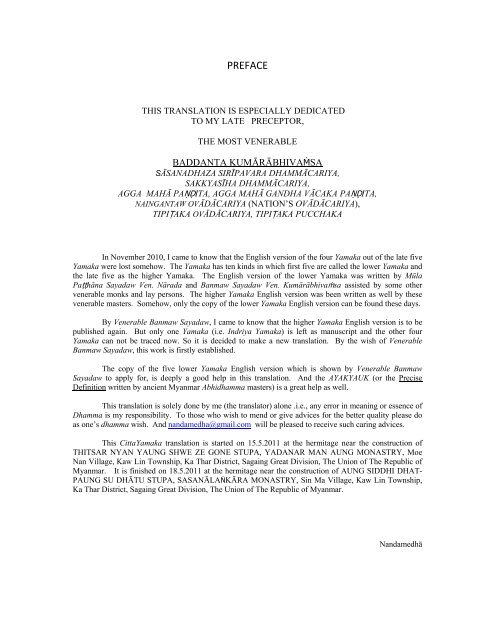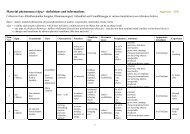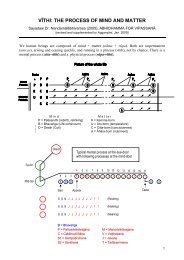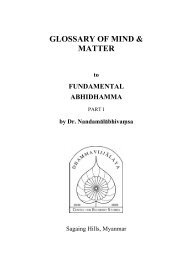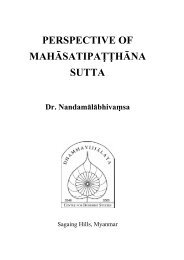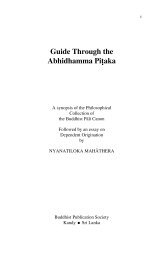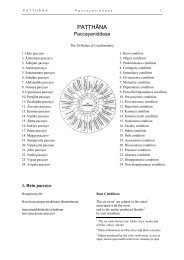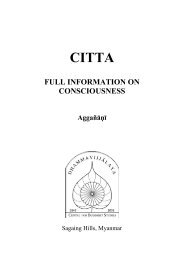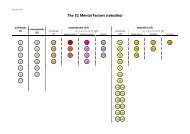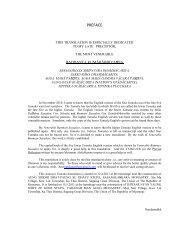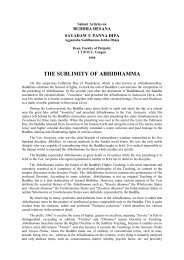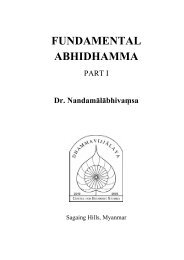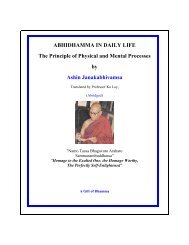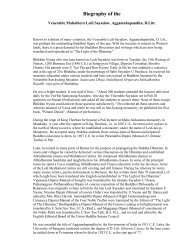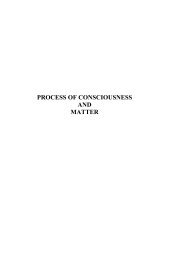Citta Yamaka - Abhidhamma.com
Citta Yamaka - Abhidhamma.com
Citta Yamaka - Abhidhamma.com
You also want an ePaper? Increase the reach of your titles
YUMPU automatically turns print PDFs into web optimized ePapers that Google loves.
PREFACE<br />
THIS TRANSLATION IS ESPECIALLY DEDICATED<br />
TO MY LATE PRECEPTOR,<br />
THE MOST VENERABLE<br />
BADDANTA KUMĀRĀBHIVAṀSA<br />
SĀSANADHAZA SIRĪPAVARA DHAMMĀCARIYA,<br />
SAKKYASĪHA DHAMMĀCARIYA,<br />
AGGA MAHĀ PAṆḌITA, AGGA MAHĀ GANDHA VĀCAKA PAṆḌITA,<br />
NAINGANTAW OVĀDĀCARIYA (NATION’S OVĀDĀCARIYA),<br />
TIPIṬAKA OVĀDĀCARIYA, TIPIṬAKA PUCCHAKA<br />
In November 2010, I came to know that the English version of the four <strong>Yamaka</strong> out of the late five<br />
<strong>Yamaka</strong> were lost somehow. The <strong>Yamaka</strong> has ten kinds in which first five are called the lower <strong>Yamaka</strong> and<br />
the late five as the higher <strong>Yamaka</strong>. The English version of the lower <strong>Yamaka</strong> was written by Mūla<br />
Paṭṭhāna Sayadaw Ven. Nārada and Banmaw Sayadaw Ven. Kumārābhivaṁsa assisted by some other<br />
venerable monks and lay persons. The higher <strong>Yamaka</strong> English version was been written as well by these<br />
venerable masters. Somehow, only the copy of the lower <strong>Yamaka</strong> English version can be found these days.<br />
By Venerable Banmaw Sayadaw, I came to know that the higher <strong>Yamaka</strong> English version is to be<br />
published again. But only one <strong>Yamaka</strong> (i.e. Indriya <strong>Yamaka</strong>) is left as manuscript and the other four<br />
<strong>Yamaka</strong> can not be traced now. So it is decided to make a new translation. By the wish of Venerable<br />
Banmaw Sayadaw, this work is firstly established.<br />
The copy of the five lower <strong>Yamaka</strong> English version which is shown by Venerable Banmaw<br />
Sayadaw to apply for, is deeply a good help in this translation. And the AYAKYAUK (or the Precise<br />
Definition written by ancient Myanmar <strong>Abhidhamma</strong> masters) is a great help as well.<br />
This translation is solely done by me (the translator) alone .i.e., any error in meaning or essence of<br />
Dhamma is my responsibility. To those who wish to mend or give advices for the better quality please do<br />
as one’s dhamma wish. And nandamedha@gmail.<strong>com</strong> will be pleased to receive such caring advices.<br />
This <strong>Citta</strong><strong>Yamaka</strong> translation is started on 15.5.2011 at the hermitage near the construction of<br />
THITSAR NYAN YAUNG SHWE ZE GONE STUPA, YADANAR MAN AUNG MONASTRY, Moe<br />
Nan Village, Kaw Lin Township, Ka Thar District, Sagaing Great Division, The Union of The Republic of<br />
Myanmar. It is finished on 18.5.2011 at the hermitage near the construction of AUNG SIDDHI DHAT-<br />
PAUNG SU DHĀTU STUPA, SASANĀLAṄKĀRA MONASTRY, Sin Ma Village, Kaw Lin Township,<br />
Ka Thar District, Sagaing Great Division, The Union of The Republic of Myanmar.<br />
Nandamedhā
FOREWORD<br />
YAMASSA VISAYĀTῙTAṀ , LOKANĀTHAṀ BHIVANDIYA ,<br />
DHAMMAṀ SAṀGHAṄCA AMALAṀ, GUṆASĀMIṄCA ME GARUṀ. (¹)<br />
BEING THE ONE BEYOND THE MEAN OF DEATHNESS,<br />
BEINGS’ VENERABLE LORD BUDDHA, THE HIGHNESS,<br />
OUT OF MENTAL DIRTS; THE DHAMMA AND THE SAṀGHĀ,<br />
AS WELL AS KUMĀRA MAHĀTHERA, MY LATE PRECEPTOR<br />
TO THOSE OF HIGHLY HONOURED, I DEEPLY DO MY GĀRAVĀ. (²)<br />
The essence of Dhamma, especially of <strong>Abhidhamma</strong>, can be best understood only by Pāḷi, the<br />
original language used by the Lord Buddha. As usual, the changing into another language can vary the<br />
meaning and essence of the origin. Nevertheless, for those who wish to glance some of the essence of<br />
Buddha’s doctrine, this English version is written.<br />
To get more precise meaning, go with Pāḷi version and do with mediation. It is strongly urged that<br />
studying this English version can be much delightful only when the Pāḷi version is not neglected. The Pāḷi<br />
version re<strong>com</strong>mended here is the Chaṭṭha Saṅgīti Edition. The guidelines from good <strong>Abhidhamma</strong><br />
scholars or a basic knowledge in <strong>Abhidhamma</strong> is at least a necessity.<br />
Because of the limited access, time, language barrier (especially in grammatical basis) and my<br />
knowledge, may I ask for the forgiveness and sympathy if un-appropriate usage or translation is seen by the<br />
readers.<br />
This is intended to be a track rather than a text for the study of Buddha Dhamma. For broader<br />
view, translations in some phrases are changed without interfering the original meaning.<br />
The will of mine (the translator’s):<br />
1. The copyright of this writing is FREE, as Dhamma was freely given by the Dhamma<br />
Master, the Lord Buddha.<br />
2. No one, no organization, no group, no what-so-ever can claim the copyright ownership<br />
of this writing.<br />
3. Each and every personnel, group or what-so-ever can print or copy; or both to the<br />
whole, or any part(s) of this writing and mentioning this origin is not a necessity.<br />
4. Those who copy or print the part(s) or the whole writing must not claim the ownership<br />
of those copied or printed parts. And must note that those parts can be freely copied or<br />
printed; if necessary.<br />
5. For Muditā, may nandamedha@gmail.<strong>com</strong> receive the information when there’s or<br />
there’ll be a copying or printing process on the part(s) or the whole of this writing.<br />
6. Any distribution which is the copy part of this writing must be FREE (or non-profit<br />
action).
Nandamedhā<br />
28.2.2011<br />
( 1 ) The Pāḷi verse is from AYAKAUK ( precise definition of <strong>Abhidhamma</strong> written by ancient Myanmar<br />
scholars ).<br />
(2) GĀRAVĀ ( Pāḷi ) = Respect; veneration; homage; heedfulness
GENERAL<br />
When this translation is to be done, there are some rules that have been made;<br />
(a) To use the familiar usage for this translation which is intended for the ordinary (self-studying) personnel<br />
(b) Must not sway in the meaning<br />
(c) Must be the same in usage as the first (five) <strong>Yamaka</strong> English Version which is now available; and should<br />
make no different usage (that might dishonors the old version) unless when it is a truly necessity<br />
(d) Must be a harmony with the first (five) <strong>Yamaka</strong> English Version<br />
(e) Except for some words, will try to translate all Pāḷi words<br />
(f) Put foot-notes when it is necessary<br />
(g) Make the readers to get some other knowledge concerning Dhamma<br />
Because of some rules, it is difficult to make some translations in some places.<br />
For instance, Okāsa word is so wide. And so yattha (pronoun in general), has a range of meanings;<br />
plane/place/abode/dwelling/period/state/situation/at time being and etc., concerning where and when representing<br />
locative case. But as it was translated as “plane” always in previous (<strong>Yamaka</strong> English) translation, this translation is<br />
still the same. The word “state” might be the best (not perfect) for this word Okāsa, but as the rule (c) is made up,<br />
“plane” is the word I have chosen even though not much delighted in some sense. But as this translation is for the<br />
step (not a text) for the Dhamma study; and for the rule (d), it is proudly presented. And not using “abode” or<br />
“period” accordingly is the same intention (i.e., for the stable translation) and most of all for the rule (c).<br />
Some of the sentences may be too long for the reader, but to help in <strong>com</strong>parative-study with original Pāḷi, it is still<br />
long and may be a bit confuse or unclear in the meaning. Which is the main verb Which is/are the subject(s) But<br />
as this translation is also intended as a step to hold Pāḷi sentence-constructing-style in some sense, there are many<br />
long sentences. But for some clear information, some short sentences are made in some places. For some Pāḷi<br />
words, such as {copulative or disjunctive particle, ca (and, too, also, as well….)}; when translation is done,<br />
sometimes it is left un-translated in some places. But when it is translated, even when it represents to a verb (in<br />
some places) the translation word “also” is placed not only before or after the verb, and also sometimes placed near<br />
noun for the better of the wide knowledge in understanding Dhamma. And some of the words which are in present<br />
tense are changed into present participles in order to get/hold the deep and precise meanings (by the rule of<br />
“vattamānā paccuppanne”). It is sometimes done not all because of the grammatical styles of English and Pāḷi are<br />
not the same. And even when the grammatical approaches can be matched: for the wider knowledge in Dhamma,<br />
that particular translation style is used here and there in the translation.<br />
And most of all, it is my view that gantha (scriptures) are mostly in upalakkhaṇa or nayadassana (i.e., a basis which<br />
can be a standard). So as long as the translation is not contradicted to the original meaning, it is eligible to use other<br />
meanings. As so, this is just the (aid as in) translation (style) and intends to stand as a track rather than a text.<br />
In using Pāḷi, Ṁ/ṁ is used, instead of Ṃ/ṃ, in honoring the old usage.<br />
For the smooth under taking, without contradicting the essence, some grammatical changes are made, from singular<br />
to plural, active to passive and vice versa.
For the broader view, even for a word - kāmāvācāra is translated as sense sphere 1 or sensuous sphere 2 or sensual<br />
sphere 3 . And there are many alike.<br />
When I informed a venerable scholar monk that I am to make the translation of some <strong>Yamaka</strong>, one admonishing and<br />
one praising were given. The admonishing “Better to make it with other two or three scholars” is in vain due to my<br />
current situation. The praising “It will be a better than nothing” is deeply considered. When feeling that this piece<br />
of something is not an essence breaking and worth giving, I heartedly make this translation.<br />
By <strong>Yamaka</strong>, may all be Yamako 4 .<br />
My (the translator) name is Nandamedhā. I am a (Theravāda) hermit since 8.1.2000. Before be<strong>com</strong>ing a hermit, I<br />
was been for 20 months as a Theravāda novice and 3 years as a Theravāda monk. I was born in Pyay, in middle<br />
Myanmar, on 19.11.1977.<br />
1 Too much following and flowing in sensation at this plane<br />
2 Too much delighted at this plane<br />
3 Too much gratified, attractive, indulged at this plane<br />
4 The one who over<strong>com</strong>es zāti (which causes death) and five upādānakkhandha (which die)
ACKNOWLEDGEMENT<br />
This work is possible only when there is a great deal of supports. It will not be enough to show the<br />
gratitude of those supporters just in words. But without mentioning them would be a much flaw indeed. I am<br />
much obliged and overwhelmed with gratitude of the followings:<br />
(a) The un‐<strong>com</strong>parable Sammāsambuddha<br />
(b) The sublime Dhamma<br />
(c) The great Saṁghā<br />
(d) The most Venerable Sayadaws<br />
(e) The Dhamma Scholars<br />
(f) The lay supporters<br />
(g) The every kind of supports of far and near<br />
(h) In the very rural area, where very low capacity in using electricity (3 hours maximum per day), making this<br />
translation a possibility is truly a great challenge especially when the time‐table for 4 <strong>Yamaka</strong> translations<br />
(i.e., Saṅkhāra <strong>Yamaka</strong>, Anusaya <strong>Yamaka</strong>, <strong>Citta</strong> <strong>Yamaka</strong> and Dhamma <strong>Yamaka</strong>) is less than 9 weeks.<br />
When it is decided to make the translation, my brother lends his lap‐top which was then at Mandalay.<br />
About 100 miles is carried out by train. And 30 miles at least by motor bike by my father just to give it to<br />
me. As of my current situations, I am not able to do the translation at one sitting. As I have a kind of<br />
Mobile‐Sasana activity these days, I am to move from a place to another in every 5/6 days. And when all<br />
journeys are generally done just by walking in the rainy season at rainy places where the destinations are<br />
ranged from 7 – 40 miles, this work is more than just a work. Carrying not just a robe and some personal<br />
belongings in an alms‐bowl, but also a lap‐top and 5 books (3 Pāḷi <strong>Yamaka</strong> books, 1 Ayakauk and 1book<br />
in total) is sometimes a bit exhausted especially when<br />
the destinations are far away. Sometimes such a day‐journey is more than 40 miles walking alone and unavoidable.<br />
Wet as it is raining cats and dogs, but still sweat for such mud and track.<br />
Only when it is helped by the devotees of the rural area, it is a great relief indeed then. Even preparations<br />
for the usage of electricity {such as carrying 12‐K heavy battery by the (respective) villagers to the nearest<br />
station every night to recharge, so that it might be used tomorrow in day time … and many more} is a<br />
great deal indeed. But not every night is possible nor is the day time.<br />
Indeed the lending of their time, energy and every support I can receive is more than just precious. By<br />
such preparations this task is carried out. While it is on the move, a great deal of aids and supports from<br />
many local sources are the appetite I am much relied upon.<br />
I translate the version into materiality, and they transform it into reality.<br />
Without them (including many un‐seen dhamma supports from various sources), rather than the whole<br />
translation, not even a single word can be a possibility.<br />
MAY ALL, WHO MADE THIS POSSIBLE, BE FREED FROM THE PAIRED WORLD.<br />
Nandamedhā
ABHIDHAMMA PIṬAKA 1<br />
PAIRS ON CONSCIOUSNESS (CITTA YAMAKA PĀḶI 2 )<br />
Veneration to that Exalted, the Purified, the Fully Self-Enlightened.<br />
(NAMO TASSA BHAGAVATO ARAHATO SAṀĀSAMBUDDHA)<br />
SUMMARY (UDDESA)<br />
1. ORDINARY OF PURE CONSCIOUSNESS<br />
(SUDDHACITTASĀMAÑÑA)<br />
1. CHAPTER ON INDIVIDUAL (PUGGALAVĀRA)<br />
1. CHAPTER ON CLASSIFICATION OF RISE AND CEASE, AND PERIOD<br />
(UPPĀDANIRODHAKĀLASAṀBHEDAVĀRA) 3<br />
1. Consciousness arises 4 , and does not cease, at this person. Consciousness will cease 5 , and will not<br />
arise, at that person.<br />
(Or else,) 6 consciousness will cease, and will not arise, at this person. Consciousness arises, and<br />
does not cease, at that person.<br />
Consciousness does not arise, and ceases, at this person. Consciousness will not cease, and will<br />
arise, at that person.<br />
Consciousness will not cease, and will arise, at this person. Consciousness does not arise, and<br />
ceases, at that person.<br />
1 ABHIDHAMMA PIṬAKA = ABHI (profound) + DHAMMA (doctrine)+ PIṬAKA (the basket) = The basket of Profound<br />
doctrine<br />
2 CITTA YAMKA PĀḶI ; CITTA + YAMAKA + PA + ĀḶI ; CITTA = Consciousness ; YAMAKA = Pairs ; PA = the nobles ; ĀḶI<br />
= the (taking) process; “THE PAIRS ON CONSCIOUSNESS” WHICH IS CARRIED ALONG THE NOBLES<br />
3 It is named “UPPĀDANIRODHAKĀLASAṀBHEDAVĀRA” for it includes (uppāda khaṇa) the arising moment and<br />
(bhaṅga khaṇa) the ceasing moment, as well as the present period and the future period. And so on, until<br />
“ATIKKANTAKĀLAVĀRA” should be understood.<br />
4 Uppazzati ; arises [of (uppāda khaṇa) the arising moment]<br />
5 Niruzzhati; ceases [of (bhaṅga khaṇa) the ceasing moment]<br />
6 (Or else,) ‐ The words in the brackets should be repeated in all the following sentences accordingly.
2. CHAPTER ON RISE AND APPEAR<br />
(UPĀDUPPANNAVĀRA)<br />
2. Consciousness arises at this person. Consciousness appears 7 at that person.<br />
Consciousness appears at this person. Consciousness arises at that person.<br />
Consciousness does not arise at this person. Consciousness does not appear at that person.<br />
Consciousness does not appear at this person. Consciousness does not arise at that person.<br />
3. CHAPTER ON CEASE AND APPEAR<br />
(NIRODHUPPANNAVĀRA)<br />
3. Consciousness ceases at this person. Consciousness appears at that person.<br />
Consciousness appears at this person. Consciousness ceases at that person.<br />
Consciousness does not cease at this person. Consciousness does not appear at that person.<br />
Consciousness does not appear at this person. Consciousness does not cease at that person.<br />
4. CHAPTER ON RISE<br />
(UPPĀDAVĀRA)<br />
4. Consciousness arises at this person. Consciousness had arisen at that person.<br />
Consciousness had arisen at this person. Consciousness arises at that person.<br />
Consciousness does not arise at this person. Consciousness had not arisen at that person.<br />
Consciousness had not arisen at this person. Consciousness does not arise at that person.<br />
5. Consciousness arises at this person. Consciousness will arise at that person.<br />
Consciousness will arise at this person. Consciousness arises at that person.<br />
Consciousness does not arise at this person. Consciousness will not arise at that person.<br />
Consciousness will not arise at this person. Consciousness does not arise at that person.<br />
6. Consciousness had arisen at this person. Consciousness will arise at that person.<br />
Consciousness will arise at this person. Consciousness had arisen at that person.<br />
Consciousness had not arisen at this person. Consciousness will not arise at that person.<br />
Consciousness will not arise at this person. Consciousness had not arisen at that person.<br />
5. CHAPTER ON CEASE<br />
(NIRODHAVĀRA)<br />
7 uppannaṁ = appears [of (any) three moments: (uppāda khaṇa) the arising moment, (ṭhita khaṇa) the<br />
standing moment, and (bhaṅga khaṇa) the ceasing moment]
7. Consciousness ceases at this person. Consciousness had ceased at that person.<br />
Consciousness had ceased at this person. Consciousness ceases at that person.<br />
Consciousness does not cease at this person. Consciousness had not ceased at that person.<br />
Consciousness had not ceased at this person. Consciousness does not cease at that person.<br />
8. Consciousness ceases at this person. Consciousness will cease at that person.<br />
Consciousness will cease at this person. Consciousness ceases at that person.<br />
Consciousness does not cease at this person. Consciousness will not cease at that person.<br />
Consciousness will not cease at this person. Consciousness does not cease at that person.<br />
9. Consciousness had ceased at this person. Consciousness will cease at that person.<br />
Consciousness will cease at this person. Consciousness had ceased at that person.<br />
Consciousness had not ceased at this person. Consciousness will not cease at that person.<br />
Consciousness will not cease at this person. Consciousness had not ceased at that person.<br />
6. CHAPTER ON RISE AND CEASE<br />
(UPPĀDANIRODHAVĀRA)<br />
10. Consciousness arises at this person. Consciousness had ceased at that person.<br />
Consciousness had ceased at this person. Consciousness arises at that person.<br />
Consciousness does not arise at this person. Consciousness had not ceased at that person.<br />
Consciousness had not ceased at this person. Consciousness does not arise at that person.<br />
11. Consciousness arises at this person. Consciousness will cease at that person.<br />
Consciousness will cease at this person. Consciousness arises at that person.<br />
Consciousness does not arise at this person. Consciousness will not cease at that person.<br />
Consciousness will not cease at this person. Consciousness does not arise at that person.<br />
12. Consciousness had arisen at this person. Consciousness will cease at that person.<br />
Consciousness will cease at this person. Consciousness had arisen at that person.<br />
Consciousness had not arisen at this person. Consciousness will not cease at that person.<br />
Consciousness will not cease at this person. Consciousness had not arisen at that person.<br />
7. CHAPTER ON ARISING AND NOT CEASE<br />
(UPPAZZAMĀNANANIRODHAVĀRA)<br />
13. Consciousness arises at this person. Consciousness does not cease at that person.<br />
Consciousness does not cease at this person. Consciousness arises at that person.
Consciousness does not arise at this person. Consciousness cease at that person.<br />
Consciousness cease at this person. Consciousness does not arise at that person.<br />
8. CHAPTER ON ARISING AND APPEAR<br />
(UPPAZZAMĀNUPPANNAVĀRA)<br />
14. Consciousness is arising 8 at this person. Consciousness appears at that person.<br />
Consciousness appears at this person. Consciousness is arising at that person.<br />
Consciousness is not arising at this person. Consciousness does not appear at that person.<br />
Consciousness does not appear at this person. Consciousness is not arising at that person.<br />
9. CHAPTER ON CEASING AND APPEAR<br />
(NIRUZZHAMĀNUPPANNAVĀRA)<br />
15. Consciousness is ceasing at this person. Consciousness appears at that person.<br />
Consciousness appears at this person. Consciousness is ceasing at that person.<br />
Consciousness is not ceasing at this person. Consciousness does not appear at that person.<br />
Consciousness does not appear at this person. Consciousness is not ceasing at that person.<br />
10. CHAPTER ON APPEAR AND RISE<br />
(UPPANNUPPĀDAVĀRA)<br />
16. Consciousness appears at this person. Consciousness had arisen at that person.<br />
Consciousness had arisen at this person. Consciousness appears at that person.<br />
Consciousness does not appear at this person. Consciousness had not arisen at that person.<br />
Consciousness had not arisen at this person. Consciousness does not appear at that person.<br />
Consciousness appears at this person. Consciousness will arise at that person.<br />
Consciousness will arise at this person. Consciousness appears at that person.<br />
Consciousness does not appear at this person. Consciousness will not arise at that person.<br />
Consciousness will not arise at this person. Consciousness does not appear at that person.<br />
11. CHAPTER ON PAST AND FUTURE<br />
(ATῙTĀNĀGATAVĀRA)<br />
17. Consciousness had arisen, and does not appear, at this person. Consciousness will arise at that<br />
person.<br />
8 uppazzamānaṁ = is arising
Consciousness will arise, and does not appear, at this person. Consciousness had arisen at that<br />
person.<br />
Consciousness had not arisen, and it is not that it does not appear, at this person. Consciousness<br />
will not arise at that person.<br />
Consciousness will not arise, and it is not that it does not appear, at this person. Consciousness<br />
had not arisen at that person.<br />
12. CHAPTER ON APPEAR AND ARISING<br />
(UPPANNUPPAZZAMĀNAVĀRA)<br />
18. (This consciousness) appears. (That consciousness) is arising.<br />
(This consciousness) is arising. (That consciousness) appears.<br />
(This consciousness) does not appear. (That consciousness) is not arising.<br />
(This consciousness) is not arising. (That consciousness) does not appear.<br />
13. CHAPTER ON DISAPPEAR AND CEASING<br />
(NIRUDDHANIRUZZHAMĀNAVĀRA)<br />
19. (This consciousness) disappears 9 (at this person). (That consciousness) is ceasing (at that<br />
person).<br />
(This consciousness) is ceasing (at this person). (That consciousness) disappears (at that person).<br />
(This consciousness) does not disappear (at this person). (That consciousness) is not ceasing (at<br />
that person).<br />
(This consciousness) is not ceasing (at this person). (That consciousness) does not disappear (at<br />
that person).<br />
14. CHAPTER ON PERIOD-PASSING<br />
(ATIKKANTAKĀLAVĀRA)<br />
20. Consciousness has period-passing over the arising moment by mean of moment-transgression at<br />
this person.<br />
Consciousness has period-passing over the ceasing moment by mean of moment-transgression at<br />
that person.<br />
Consciousness has period-passing over the ceasing moment by mean of moment-transgression at<br />
this person.<br />
Consciousness has period-passing over the arising moment by mean of moment-transgression at<br />
that person.<br />
9 Niruddha = disappears [of (any) three moments: (uppāda khaṇa) the arising moment, (ṭhita khaṇa) the<br />
standing moment, and (bhaṅga khaṇa) the ceasing moment]
Consciousness has not period-passing over the arising moment by mean of moment-transgression<br />
at this person.<br />
Consciousness has not period-passing over the ceasing moment by mean of momenttransgression<br />
at that person.<br />
Consciousness has not period-passing over the ceasing moment by mean of momenttransgression<br />
at this person.<br />
Consciousness has not period-passing over the arising moment by mean of moment-transgression<br />
at that person.<br />
1. ORDINARY OF PURE CONSCIOUSNESS<br />
(SUDDHACITTASĀMAÑÑA)<br />
2. CHAPTER ON NATURE<br />
(DHAMMAVĀRA)<br />
1. CHAPTER ON CLASSIFICATION OF RISE AND CEASE, AND PERIOD<br />
(UPPĀDANIRODHAKĀLASAṀBHEDAVĀRA)<br />
21. This consciousness arises, and does not cease. That consciousness will cease, and will not arise.<br />
This consciousness will cease, and will not arise. That consciousness arises, and does not cease.<br />
This consciousness does not arise, and ceases. That consciousness will not cease, and will arise.<br />
This consciousness will not cease, and will arise. That consciousness does not arise, and ceases.<br />
2. CHAPTER ON RISE AND APPEAR<br />
(UPĀDUPPANNAVĀRA)<br />
22. This consciousness arises. That consciousness appears.<br />
This consciousness appears. That consciousness arises.<br />
This consciousness does not arise. That consciousness does not appear.<br />
This consciousness does not appear. That consciousness does not arise.<br />
3. CHAPTER ON CEASE AND APPEAR<br />
(NIRODHUPPANNAVĀRA)<br />
23. This consciousness ceases. That consciousness appears.<br />
This consciousness appears. That consciousness ceases.<br />
This consciousness does not cease. That consciousness does not appear.
This consciousness does not appear. That consciousness does not cease.<br />
4. CHAPTER ON RISE<br />
(UPPĀDAVĀRA)<br />
24. This consciousness arises. That consciousness had arisen.<br />
This consciousness had arisen. That consciousness arises.<br />
This consciousness does not arise. That consciousness had not arisen.<br />
This consciousness had not arisen. That consciousness does not arise.<br />
25. This consciousness arises. That consciousness will arise.<br />
This consciousness will arise. That consciousness arises.<br />
This consciousness does not arise. That consciousness will not arise.<br />
This consciousness will not arise. That consciousness does not arise.<br />
26. This consciousness had arisen. That consciousness will arise.<br />
This consciousness will arise. That consciousness had arisen.<br />
This consciousness had not arisen. That consciousness will not arise.<br />
This consciousness will not arise. That consciousness had not arisen.<br />
5. CHAPTER ON CEASE<br />
(NIRODHAVĀRA)<br />
27. This consciousness ceases. That consciousness had ceased.<br />
This consciousness had ceased. That consciousness ceases.<br />
This consciousness does not cease. That consciousness had not ceased.<br />
This consciousness had not ceased. That consciousness does not cease.<br />
28. This consciousness ceases. That consciousness will cease.<br />
This consciousness will cease. That consciousness ceases.<br />
This consciousness does not cease. That consciousness will not cease.<br />
This consciousness will not cease. That consciousness does not cease.<br />
29. This consciousness had ceased. That consciousness will cease.<br />
This consciousness will cease. That consciousness had ceased.<br />
This consciousness had not ceased. That consciousness will not cease.<br />
This consciousness will not cease. That consciousness had not ceased.
6. CHAPTER ON RISE AND CEASE<br />
(UPPĀDANIRODHAVĀRA)<br />
30. This consciousness arises. That consciousness had ceased.<br />
This consciousness had ceased. That consciousness arises.<br />
This consciousness does not arise. That consciousness had not ceased.<br />
This consciousness had not ceased. That consciousness does not arise.<br />
31. This consciousness arises. That consciousness will cease.<br />
This consciousness will cease. That consciousness arises.<br />
This consciousness does not arise. That consciousness will not cease.<br />
This consciousness will not cease. That consciousness does not arise.<br />
32. This consciousness had arisen. That consciousness will cease.<br />
This consciousness will cease. That consciousness had arisen.<br />
This consciousness had not arisen. That consciousness will not cease.<br />
This consciousness will not cease. That consciousness had not arisen.<br />
7. CHAPTER ON ARISING AND NOT CEASE<br />
(UPPAZZAMĀNANANIRODHAVĀRA)<br />
33. This consciousness arises. That consciousness does not cease.<br />
This consciousness does not cease. That consciousness arises.<br />
This consciousness does not arise. That consciousness cease.<br />
This consciousness ceases. That consciousness does not arise.<br />
8. CHAPTER ON ARISING AND APPEAR<br />
(UPPAZZAMĀNUPPANNAVĀRA)<br />
34. This consciousness is arising. That consciousness appears.<br />
This consciousness appears. That consciousness is arising.<br />
This consciousness is not arising. That consciousness does not appear.<br />
This consciousness does not appear. That consciousness is not arising.<br />
9. CHAPTER ON CEASING AND APPEAR<br />
(NIRUZZHAMĀNUPPANNAVĀRA)<br />
35. This consciousness is ceasing. That consciousness appears.<br />
This consciousness appears. That consciousness is ceasing.
This consciousness is not ceasing. That consciousness does not appear.<br />
This consciousness does not appear. That consciousness is not ceasing.<br />
10. CHAPTER ON APPEAR AND RISE<br />
(UPPANNUPPĀDAVĀRA)<br />
36. This consciousness appears. That consciousness had arisen.<br />
This consciousness had arisen. That consciousness appears.<br />
This consciousness does not appear. That consciousness had not arisen.<br />
This consciousness had not arisen. That consciousness does not appear.<br />
This consciousness appears. That consciousness will arise.<br />
This consciousness will arise. That consciousness appears.<br />
This consciousness does not appear. That consciousness will not arise.<br />
This consciousness will not arise. That consciousness does not appear.<br />
11. CHAPTER ON PAST AND FUTURE<br />
(ATῙTĀNĀGATAVĀRA)<br />
37. This consciousness had arisen, and does not appear. That consciousness will arise.<br />
This consciousness will arise, and does not appear. That consciousness had arisen.<br />
This consciousness had not arisen, and it is not that it does not appear. That consciousness will<br />
not arise.<br />
This consciousness will not arise, and it is not that it does not appear. That consciousness had not<br />
arisen.<br />
12. CHAPTER ON APPEAR AND ARISING<br />
(UPPANNUPPAZZAMĀNAVĀRA)<br />
38. (This consciousness) appears. (That consciousness) is arising.<br />
(This consciousness) is arising. (That consciousness) appears.<br />
(This consciousness) does not appear. (That consciousness) is not arising.<br />
(This consciousness) is not arising. (That consciousness) does not appear.<br />
13. CHAPTER ON DISAPPEAR AND CEASING<br />
(NIRUDDHANIRUZZHAMĀNAVĀRA)<br />
39. (This consciousness) disappears. (That consciousness) is ceasing.<br />
(This consciousness) is ceasing. (That consciousness) disappears.
(This consciousness) does not disappear. (That consciousness) is not ceasing.<br />
(This consciousness) is not ceasing. (That consciousness) does not disappear.<br />
14. CHAPTER ON PERIOD-PASSING<br />
(ATIKKANTAKĀLAVĀRA)<br />
40. This consciousness has period-passing over the arising moment by mean of momenttransgression.<br />
That consciousness has period-passing over the ceasing moment by mean of momenttransgression.<br />
This consciousness has period-passing over the ceasing moment by mean of momenttransgression.<br />
That consciousness has period-passing over the arising moment by mean of momenttransgression.<br />
This consciousness has not period-passing over the arising moment by mean of momenttransgression.<br />
That consciousness has not period-passing over the ceasing moment by mean of momenttransgression.<br />
This consciousness has not period-passing over the ceasing moment by mean of momenttransgression.<br />
That consciousness has not period-passing over the arising moment by mean of momenttransgression.<br />
1. ORDINARY OF PURE CONSCIOUSNESS<br />
(SUDDHACITTASĀMAÑÑA)<br />
3. CHAPTER ON INDIVIDUAL AND NATURE<br />
(PUGGALADHAMMAVĀRA)<br />
1. CHAPTER ON CLASSIFICATION OF RISE AND CEASE, AND PERIOD<br />
(UPPĀDANIRODHAKĀLASAṀBHEDAVĀRA)<br />
41. This consciousness arises, and does not cease, at this person. That consciousness will cease, and<br />
will not arise, at that person.<br />
This consciousness will cease, and will not arise, at this person. That consciousness arises, and<br />
does not cease, at that person.
This consciousness does not arise, and ceases, at this person. That consciousness will not cease,<br />
and will arise, at that person.<br />
This consciousness will not cease, and will arise, at this person. That consciousness does not<br />
arise, and ceases, at that person.<br />
2. CHAPTER ON RISE AND APPEAR<br />
(UPĀDUPPANNAVĀRA)<br />
42. This consciousness arises at this person. That consciousness appears at that person.<br />
This consciousness appears at this person. That consciousness arises at that person.<br />
This consciousness does not arise at this person. That consciousness does not appear at that<br />
person.<br />
This consciousness does not appear at this person. That consciousness does not arise at that<br />
person.<br />
3. CHAPTER ON CEASE AND APPEAR<br />
(NIRODHUPPANNAVĀRA)<br />
43. This consciousness ceases at this person. That consciousness appears at that person at that<br />
person.<br />
This consciousness appears at this person. That consciousness ceases at that person at that<br />
person.<br />
This consciousness does not cease at this person. That consciousness does not appear at that<br />
person.<br />
This consciousness does not appear at this person. That consciousness does not cease at that<br />
person.<br />
4. CHAPTER ON RISE<br />
(UPPĀDAVĀRA)<br />
44. This consciousness arises at this person. That consciousness had arisen at that person.<br />
This consciousness had arisen at this person. That consciousness arises at that person.<br />
This consciousness does not arise at this person.<br />
person.<br />
This consciousness had not arisen at this person.<br />
person.<br />
That consciousness had not arisen at that<br />
That consciousness does not arise at that<br />
45. This consciousness arises at this person. That consciousness will arise at that person.<br />
This consciousness will arise at this person. That consciousness arises at that person.<br />
This consciousness does not arise at this person. That consciousness will not arise at that person.
This consciousness will not arise at this person. That consciousness does not arise at that person.<br />
46. This consciousness had arisen at this person. That consciousness will arise at that person.<br />
This consciousness will arise at this person. That consciousness had arisen at that person.<br />
This consciousness had not arisen at this person. That consciousness will not arise at that person.<br />
This consciousness will not arise at this person. That consciousness had not arisen at that person.<br />
5. CHAPTER ON CEASE<br />
(NIRODHAVĀRA)<br />
47. This consciousness ceases at this person. That consciousness had ceased at that person.<br />
This consciousness had ceased at this person. That consciousness ceases at that person.<br />
This consciousness does not cease at this person. That consciousness had not ceased at that<br />
person.<br />
This consciousness had not ceased at this person. That consciousness does not cease at that<br />
person.<br />
48. This consciousness ceases at this person. That consciousness will cease at that person.<br />
This consciousness will cease at this person. That consciousness ceases at that person.<br />
This consciousness does not cease at this person. That consciousness will not cease at that<br />
person.<br />
This consciousness will not cease at this person. That consciousness does not cease at that<br />
person.<br />
49. This consciousness had ceased at this person. That consciousness will cease at that person.<br />
This consciousness will cease at this person. That consciousness had ceased at that person.<br />
This consciousness had not ceased at this person. That consciousness will not cease at that<br />
person.<br />
This consciousness will not cease at this person. That consciousness had not ceased at that<br />
person.<br />
6. CHAPTER ON RISE AND CEASE<br />
(UPPĀDANIRODHAVĀRA)<br />
50. This consciousness arises at this person. That consciousness had ceased at that person.<br />
This consciousness had ceased at this person. That consciousness arises at that person.<br />
This consciousness does not arise at this person. That consciousness had not ceased at that<br />
person.
This consciousness had not ceased at this person. That consciousness does not arise at that<br />
person<br />
51. This consciousness arises at this person. That consciousness will cease at that person.<br />
This consciousness will cease at this person. That consciousness arises at that person.<br />
This consciousness does not arise at this person. That consciousness will not cease at that person.<br />
This consciousness will not cease at this person. That consciousness does not arise at that person.<br />
52. This consciousness had arisen at this person. That consciousness will cease at that person.<br />
This consciousness will cease at this person. That consciousness had arisen at that person.<br />
This consciousness had not arisen at this person. That consciousness will not cease at that person.<br />
This consciousness will not cease at this person. That consciousness had not arisen at that person.<br />
7. CHAPTER ON ARISING AND NOT CEASE<br />
(UPPAZZAMĀNANANIRODHAVĀRA)<br />
53. This consciousness arises at this person. That consciousness does not cease at that person.<br />
This consciousness does not cease at this person. That consciousness arises at that person.<br />
This consciousness does not arise at this person. That consciousness ceases at that person.<br />
This consciousness ceases at this person. That consciousness does not arise at that person.<br />
8. CHAPTER ON ARISING AND APPEAR<br />
(UPPAZZAMĀNUPPANNAVĀRA)<br />
54. This consciousness is arising at this person. That consciousness appears at that person.<br />
This consciousness appears at this person. That consciousness is arising at that person.<br />
This consciousness is not arising at this person. That consciousness does not appear at that<br />
person.<br />
This consciousness does not appear at this person. That consciousness is not arising at that<br />
person.<br />
9. CHAPTER ON CEASING AND APPEAR<br />
(NIRUZZHAMĀNUPPANNAVĀRA)<br />
55. This consciousness is ceasing at this person. That consciousness appears at that person.<br />
This consciousness appears at this person. That consciousness is ceasing at that person.<br />
This consciousness is not ceasing at this person. That consciousness does not appear at that<br />
person.
This consciousness does not appear at this person. That consciousness is not ceasing at that<br />
person.<br />
10. CHAPTER ON APPEAR AND RISE<br />
(UPPANNUPPĀDAVĀRA)<br />
56. This consciousness appears at this person. That consciousness had arisen at that person.<br />
This consciousness had arisen at this person. That consciousness appears at that person.<br />
This consciousness does not appear at this person. That consciousness had not arisen at that<br />
person.<br />
This consciousness had not arisen at this person. That consciousness does not appear at that<br />
person.<br />
This consciousness appears at this person. That consciousness will arise at that person.<br />
This consciousness will arise at this person. That consciousness appears at that person.<br />
This consciousness does not appear at this person. That consciousness will not arise at that<br />
person.<br />
This consciousness will not arise at this person. That consciousness does not appear at that<br />
person.<br />
11. CHAPTER ON PAST AND FUTURE<br />
(ATῙTĀNĀGATAVĀRA)<br />
57. This consciousness had arisen, and does not appear, at this person. That consciousness will arise<br />
at that person.<br />
This consciousness will arise, and does not appear, at this person. That consciousness had arisen<br />
at that person.<br />
This consciousness had not arisen, and it is not that it does not appear, at this person. That<br />
consciousness will not arise at that person.<br />
This consciousness will not arise, and it is not that it does not appear, at this person. That<br />
consciousness had not arisen at that person.<br />
12. CHAPTER ON APPEAR AND ARISING<br />
(UPPANNUPPAZZAMĀNAVĀRA)<br />
58. (This consciousness) appears (at this person). (That consciousness) is arising (at that person).<br />
(This consciousness) is arising (at this person). (That consciousness) appears (at that person).<br />
(This consciousness) does not appear (at this person). (That consciousness) is not arising (at that<br />
person).
(This consciousness) is not arising (at this person). (That consciousness) does not appear (at that<br />
person).<br />
13. CHAPTER ON DISAPPEAR AND CEASING<br />
(NIRUDDHANIRUZZHAMĀNAVĀRA)<br />
59. (This consciousness) disappears (at this person). (That consciousness) is ceasing (at that person).<br />
(This consciousness) is ceasing (at this person). (That consciousness) disappears (at that person).<br />
(This consciousness) does not disappear (at this person). (That consciousness) is not ceasing (at<br />
that person).<br />
(This consciousness) is not ceasing (at this person). (That consciousness) does not disappear (at<br />
that person).<br />
14. CHAPTER ON PERIOD-PASSING<br />
(ATIKKANTAKĀLAVĀRA)<br />
60. This consciousness has period-passing over the arising moment by mean of momenttransgression<br />
at this person.<br />
That consciousness has period-passing over the ceasing moment by mean of momenttransgression<br />
at that person.<br />
This consciousness has period-passing over the ceasing moment by mean of momenttransgression<br />
at this person.<br />
That consciousness has period-passing over the arising moment by mean of momenttransgression<br />
at that person.<br />
This consciousness has not period-passing over the arising moment by mean of momenttransgression<br />
at this person.<br />
That consciousness has not period-passing over the ceasing moment by mean of momenttransgression<br />
at that person.<br />
This consciousness has not period-passing over the ceasing moment by mean of momenttransgression<br />
at this person.<br />
That consciousness has not period-passing over the arising moment by mean of momenttransgression<br />
at that person.<br />
2. SPECIFICATION OF CONSCIOUSNESS MIXING BY MEAN OF SUTTANTA 10<br />
(SUTTANTACITTAMISSAKAVISESA)<br />
10 Discourse (for detail, Satipaṭṭhāna Suttanta should be looked)
61. Mind with greed 11 arises at this person…..pe….. 12 Mind without greed 13 arises at this person.<br />
Mind with hatred 14 arises at this person. Mind without hatred 15 arises at this person. Mind with<br />
delusion 16 arises at this person. Mind without delusion 17 arises at this person. Shortened 18 mind 19<br />
arises at this person. Broadened 20 mind 21 arises at this person. Great mind 22 arises at this person.<br />
Non-great mind 23 arises at this person. Comparable mind 24 arises at this person. In<strong>com</strong>parable<br />
mind 25 arises at this person. Tranquil mind 26 arises at this person. Un-tranquil mind 27 arises at<br />
this person. Emancipated mind 28 arises at this person. Un-emancipated mind 29 arises at this<br />
person.<br />
3. SPECIFICATION OF CONSCIOUSNESS MIXING BY MEAN OF ABHIDHAMMA 30<br />
(ABHIDHAMMACITTAMISSAKAVISESA)<br />
62. Faultless consciousness arises at this person…..pe…..Un-faultless consciousness arises at this<br />
person. Indeterminate 31 consciousness arises at this person. Consciousness associated with<br />
pleasant feeling arises at this person.<br />
(By this method, until with dust-alike 32 or without dust-alike 33 should be raised.) 34<br />
Consciousness without dust-alike arise, and does not cease, at this person. Consciousness without<br />
dust-alike will cease, and will not arise, at that person.<br />
11 saragaṁ cittaṁ = 8 lobha‐mūla citta<br />
12 …..pe….. (short term of Pāḷi ; peyyāla) = omitted/hidden words/phrases (as easy to find from the past/nearby)<br />
13 vītaragaṁ cittaṁ = (other) 81 citta (except 8 lobha‐mūla citta)<br />
14 sadosaṁ cittaṁ = 2 dosa‐mūla citta<br />
15 vītadosaṁ cittaṁ = (other) 82 citta ( except 2 dosa‐mūla citta)<br />
16 samohaṁ cittaṁ = 2 moha‐mūla citta<br />
17 vītamohaṁ cittaṁ = 87 citta (except 2 moha‐mūla citta)<br />
18 Well‐squeezed; well‐tight (distracted) consciousness<br />
19 saṁkhittaṁ cittaṁ = consciousness associated with restlessness (uddhacca)<br />
20 Loosed‐out consciousness<br />
21 vikhittaṁ cittaṁ = 88 citta [except consciousness associated with restlessness (uddhacca)]<br />
22 mahaggataṁ cittaṁ = 27 citta [i.e., 15 rūpa jhāna ( 5 kusala + 5 vipāka + 5 kiriya ), and 12 arūpa jhāna ( 4 kusala<br />
+ 4 vipāka + 4 kiriya )]<br />
23 amahaggataṁ cittaṁ = 62 citta (except 27 mahaggata citta)<br />
24 sauttaraṁ cittaṁ = 81 lokī citta<br />
25 anuttaraṁ cittaṁ = 8 lokuttara citta (i.e., 4 magga + 4 phala)<br />
26 samāhitaṁ cittaṁ = 27 mahaggata citta + 8 lokuttara citta<br />
27 asamāhitaṁ cittaṁ = 54 kāma citta (except 27 mahaggata citta + 8 lokuttara citta)<br />
28 vimuttaṁ cittaṁ = 8 lokuttara citta (i.e., 4 magga + 4 phala)<br />
29 avimuttaṁ cittaṁ = 81 lokī citta<br />
30 Profound doctrine<br />
31 Vipāka citta (resultant < just affect and produce none> consciousness) ; and Kiriya citta (functional < just action<br />
and produce none> consciousness)<br />
32 saraṇa = sa (with) + raṇa (fault/dust alike which brings lamentation )<br />
33 araṇa = a (without) + raṇa (fault/dust alike which brings lamentation )<br />
34 There are 22 tika (triplets) and 100 duka (couplets)<br />
in DHAMMASAṄGAṆῙ of KHUDDAKA NIKĀYA.
Consciousness without dust-alike will cease, and will not arise, at this person. Consciousness<br />
without dust-alike arise, and does not cease, at that person.<br />
END OF CHAPTER ON SUMMARY.<br />
(UDDESAVĀRO)<br />
EXPOSITION (NIDDESA) 35<br />
1. ORDINARY OF PURE CONSCIOUSNESS<br />
(SUDDHACITTASĀMAÑÑA)<br />
1. CHAPTER ON INDIVIDUAL (PUGGALAVĀRA)<br />
1. CHAPTER ON CLASSIFICATION OF RISE AND CEASE, AND PERIOD<br />
(UPPĀDANIRODHAKĀLASAṀBHEDAVĀRA)<br />
63. Consciousness arises, and does not cease, at this person. Consciousness will cease, and will not<br />
arise, at that person 36<br />
At the rising moment of last 37 consciousness, consciousness arises, and does not cease, will cease<br />
and will not arise at those persons. At other persons, at the rising moment of consciousness,<br />
consciousness arises, and not cease, will also cease and will also arise.<br />
Consciousness will cease, and will not arise, at this person. Consciousness arises, and does not<br />
cease, at that person<br />
Yes.<br />
Consciousness does not arise, and ceases, at this person. Consciousness will not cease, and will<br />
arise, at that person<br />
No.<br />
Consciousness will not cease, and will arise, at this person. Consciousness does not arise, and<br />
ceases, at that person<br />
None. 38<br />
2. CHAPTER ON RISE AND APPEAR<br />
(UPĀDUPPANNAVĀRA)<br />
64. Consciousness arises at this person. Consciousness appears at that person<br />
35 Analytical explanation<br />
36 (In lit.) Will consciousness arise, and will not cease, at that person (The following questions are to understood<br />
that way accordingly)<br />
37 final<br />
38 ( in Pāḷi ) Naṭṭhi = Impossible / There is no such person ( as the certain statement itself is impossible)
Yes.<br />
Consciousness appears at this person. Consciousness arises at that person<br />
At the ceasing moment of consciousness, consciousness appears; and consciousness does not<br />
arise at those persons. At the rising moment of consciousness, consciousness appears, and also<br />
arises at those persons.<br />
Consciousness does not arise at this person. Consciousness does not appear at that person<br />
At the ceasing moment of consciousness, consciousness does not arise at those persons; and (it is)<br />
not that consciousness does not appear at those persons. At persons of Nirodha absorption 39 and<br />
non-percipient beings, consciousness does not arise, and also does not appear.<br />
Consciousness does not appear at this person. Consciousness does not arise at that person<br />
Yes.<br />
3. CHAPTER ON CEASE AND APPEAR<br />
(NIRODHUPPANNAVĀRA)<br />
65. Consciousness ceases at this person. Consciousness appears at that person<br />
Yes.<br />
Consciousness appears at this person. Consciousness ceases at that person<br />
At the rising moment of consciousness, consciousness appears, at those persons; and<br />
consciousness does not cease at those persons. At the ceasing moment of consciousness,<br />
consciousness appears, and also ceases at those persons.<br />
Consciousness does not cease at this person. Consciousness does not appear at that person<br />
At the rising moment of consciousness, consciousness does not cease at those persons; and (it is)<br />
not that consciousness does not appear at those persons. At persons of Nirodha absorption and<br />
non-percipient beings, consciousness does not cease, and also does not appear.<br />
Consciousness does not appear at this person. Consciousness does not cease at that person<br />
Yes.<br />
4. CHAPTER ON RISE<br />
(UPPĀDAVĀRA)<br />
66. Consciousness arises at this person. Consciousness had arisen at that person<br />
Yes.<br />
Consciousness had arisen at this person. Consciousness arises at that person<br />
At the ceasing moment of consciousness, at persons of Nirodha absorption and non-percipient<br />
beings, consciousness had arisen at those persons; and consciousness does not arise at those<br />
persons. At the rising moment of consciousness, consciousness had arisen, and also arises at<br />
those persons.<br />
Consciousness does not arise at this person. Consciousness had not arisen at that person<br />
39 The absorption when all mental processes and mind‐made matters cease temporarily.
(It) had arisen.<br />
Consciousness had not arisen at this person. Consciousness does not arise at that person<br />
None.<br />
67. Consciousness arises at this person. Consciousness will arise at that person<br />
At the rising moment of last consciousness, consciousness arises, at those persons; and<br />
consciousness will not arise at those persons. At other persons, at the rising moment of<br />
consciousness, consciousness arises, and also will arise.<br />
Consciousness will arise at this person. Consciousness arises at that person<br />
At the ceasing moment of consciousness, at persons of Nirodha absorption and non-percipient<br />
beings, consciousness will arise at those persons; and consciousness does not arise at those<br />
persons. At the rising moment of consciousness, consciousness will arise, and also arises at those<br />
persons.<br />
Consciousness does not arise at this person. Consciousness will not arise at that person<br />
At the ceasing moment of consciousness, at persons of Nirodha absorption and non-percipient<br />
beings, consciousness does not arise at those persons; and (it is) not that consciousness will not<br />
arise at those persons. At the ceasing moment of last consciousness, consciousness does not<br />
arise, and also will not arise at those persons.<br />
Consciousness will not arise at this person. Consciousness does not arise at that person<br />
At the rising moment of last consciousness, consciousness will not arise at that person; and (it is)<br />
not that consciousness does not arise at those persons. At the ceasing moment of last<br />
consciousness, consciousness will not arise, and does not arise at those persons.<br />
68. Consciousness had arisen at this person. Consciousness will arise at that person<br />
At the persons with the last consciousness, consciousness had arisen; and consciousness will not<br />
arise at those persons. At other persons, consciousness had arisen, and will also arise.<br />
Consciousness will arise at this person. Consciousness had arisen at that person<br />
Yes.<br />
Consciousness had not arisen at this person. Consciousness will not arise at that person<br />
None.<br />
Consciousness will not arise at this person. Consciousness had not arisen at that person<br />
(It) had arisen.<br />
5. CHAPTER ON CEASE<br />
(NIRODHAVĀRA)<br />
69. Consciousness ceases at this person. Consciousness had ceased at that person<br />
Yes.<br />
Consciousness had ceased at this person. Consciousness ceases at that person<br />
At the rising moment of consciousness, at persons of Nirodha absorption and non-percipient<br />
beings, consciousness had ceased at those persons; and consciousness does not cease at those
persons. At the ceasing moment of consciousness, consciousness had ceased, and also ceases at<br />
those persons.<br />
Consciousness does not cease at this person. Consciousness had not ceased at that person<br />
(It) had ceased.<br />
Consciousness had not ceased at this person. Consciousness does not cease at that person<br />
None.<br />
70. Consciousness ceases at this person. Consciousness will cease at that person<br />
At the rising moment of last consciousness, consciousness cease, at those persons; and<br />
consciousness does not cease at those persons. At other persons, at the ceasing moment,<br />
consciousness ceases, and will also cease.<br />
Consciousness will cease at this person. Consciousness ceases at that person<br />
At the rising moment of consciousness, at persons of Nirodha absorption and non-percipient<br />
beings, consciousness will cease; and consciousness does not cease at those persons. At the<br />
ceasing moment of consciousness, consciousness will cease, and also ceases at those persons.<br />
Consciousness does not cease at this person. Consciousness will not cease at that person<br />
(It) will cease.<br />
Consciousness will not cease at this person. Consciousness does not cease at that person<br />
(It) ceases.<br />
71. Consciousness had ceased at this person. Consciousness will cease at that person<br />
At the ceasing moment of consciousness, consciousness had ceased at those persons; and<br />
consciousness will not cease at those persons. At other persons, consciousness had ceased, and<br />
will cease.<br />
Consciousness will cease at this person. Consciousness had ceased at that person<br />
Yes.<br />
Consciousness had not ceased at this person. Consciousness will not cease at that person<br />
None.<br />
Consciousness will not cease at this person. Consciousness had not ceased at that person<br />
(It) had ceased.<br />
6. CHAPTER ON RISE AND CEASE<br />
(UPPĀDANIRODHAVĀRA)<br />
72. Consciousness arises at this person. Consciousness had ceased at that person<br />
Yes.<br />
Consciousness had ceased at this person. Consciousness arises at that person<br />
At the ceasing moment of consciousness, at persons of Nirodha absorption and non-percipient<br />
beings, consciousness had ceased at those persons; and consciousness does not arise. At the<br />
rising moment of consciousness, consciousness had ceased, and also arises at those persons.
Consciousness does not arise at this person. Consciousness had not ceased at that person<br />
(It) had ceased.<br />
Consciousness had not ceased at this person. Consciousness does not arise at that person<br />
None.<br />
73. Consciousness arises at this person. Consciousness will cease at that person<br />
Yes.<br />
Consciousness will cease at this person. Consciousness arises at that person<br />
At the ceasing moment of consciousness, at persons of Nirodha absorption and non-percipient<br />
beings, consciousness will cease at those persons; and consciousness does not arise at those<br />
persons. At the rising moment of consciousness, consciousness will cease, and also arises at<br />
those persons.<br />
Consciousness does not arise at this person. Consciousness will not cease at that person<br />
At the ceasing moment of consciousness, at persons of Nirodha absorption and non-percipient<br />
beings, consciousness does not arise at those persons; and (it is) not that consciousness will not<br />
cease at those persons. At the ceasing moment of last consciousness, consciousness does not<br />
arise, and will also not cease at those persons.<br />
Consciousness will not cease at this person. Consciousness does not arise at that person<br />
Yes.<br />
74. Consciousness had arisen at this person. Consciousness will cease at that person<br />
At the ceasing moment of last consciousness, consciousness had ceased; and consciousness will<br />
not arise at those persons. At other persons, consciousness had arisen, and will also cease.<br />
Consciousness will cease at this person. Consciousness had arisen at that person<br />
Yes.<br />
Consciousness had not arisen at this person. Consciousness will not cease at that person<br />
None.<br />
Consciousness will not cease at this person. Consciousness had not arisen at that person<br />
(It) had arisen.<br />
7. CHAPTER ON ARISING AND NOT CEASE<br />
(UPPAZZAMĀNANANIRODHAVĀRA)<br />
75. Consciousness arises at this person. Consciousness does not cease at that person<br />
Yes.<br />
Consciousness does not cease at this person. Consciousness arises at that person<br />
At persons of Nirodha absorption and non-percipient beings, consciousness does not cease; and<br />
consciousness does not arise at those persons. At the rising moment of consciousness,<br />
consciousness does not cease, and also arises at those persons.<br />
Consciousness does not arise at this person. Consciousness cease at that person
At persons of Nirodha absorption and non-percipient beings, consciousness does not arise; and<br />
consciousness does not cease at those persons. At the ceasing moment of consciousness,<br />
consciousness does not arise, and also ceases at those persons.<br />
Consciousness cease at this person. Consciousness does not arise at that person<br />
Yes.<br />
8. CHAPTER ON ARISING AND APPEAR<br />
(UPPAZZAMĀNUPPANNAVĀRA)<br />
76. Consciousness is arising at this person. Consciousness appears at that person<br />
Yes.<br />
Consciousness appears at this person. Consciousness is arising at that person<br />
At the ceasing moment of last consciousness, consciousness appears; and consciousness is not<br />
arising at those persons. At the rising moment of consciousness, consciousness appears, and is<br />
also arising.<br />
Consciousness is not arising at this person. Consciousness does not appear at that person<br />
At the ceasing moment of consciousness, consciousness is not arising; and (it is) not that<br />
consciousness does not appear at those persons. At persons of Nirodha absorption and nonpercipient<br />
beings, consciousness is not arising, and also does not appear.<br />
Consciousness does not appear at this person. Consciousness is not arising at that person<br />
Yes.<br />
9. CHAPTER ON CEASING AND APPEAR<br />
(NIRUZZHAMĀNUPPANNAVĀRA)<br />
77. Consciousness is ceasing at this person. Consciousness appears at that person<br />
Yes.<br />
Consciousness appears at this person. Consciousness is ceasing at that person<br />
At the rising moment of consciousness, consciousness appears; and consciousness is not ceasing<br />
at those persons. At the ceasing moment of consciousness, consciousness appears, and is also<br />
ceasing at those persons.<br />
Consciousness is not ceasing at this person. Consciousness does not appear at that person<br />
At the rising moment of consciousness, consciousness is not ceasing; and (it is) not that<br />
consciousness does not appear at those persons. At persons of Nirodha absorption and nonpercipient<br />
beings, consciousness is not ceasing, and also does not appear.<br />
Consciousness does not appear at this person. Consciousness is not ceasing at that person<br />
Yes.<br />
10. CHAPTER ON APPEAR AND RISE<br />
(UPPANNUPPĀDAVĀRA)<br />
78. Consciousness appears at this person. Consciousness had arisen at that person
Yes.<br />
Consciousness had arisen at this person. Consciousness appears at that person<br />
At persons of Nirodha absorption and non-percipient beings, consciousness had arisen; and<br />
consciousness does not appear at those persons. At persons with consciousness, consciousness<br />
had arisen, and also appears.<br />
Consciousness does not appear at this person. Consciousness had not arisen at that person<br />
(It) had arisen.<br />
Consciousness had not arisen at this person. Consciousness does not appear at that person<br />
None.<br />
79. Consciousness appears at this person. Consciousness will arise at that person<br />
At persons with last consciousness, consciousness appears; and consciousness will not arise at<br />
those persons. At other persons with consciousness, consciousness appears, and will also arise.<br />
Consciousness will arise at this person. Consciousness appears at that person<br />
At persons of Nirodha absorption and non-percipient beings, consciousness will arise; and<br />
consciousness does not appear at those persons. At persons with consciousness, consciousness<br />
will arise, and also appears.<br />
Consciousness does not appear at this person. Consciousness will not arise at that person<br />
(It) will arise.<br />
Consciousness will not arise at this person. Consciousness does not appear at that person<br />
(It) appears.<br />
11. CHAPTER ON PAST AND FUTURE<br />
(ATῙTĀNĀGATAVĀRA)<br />
80. Consciousness had arisen, and does not appear, at this person. Consciousness will arise at that<br />
person<br />
Yes.<br />
Consciousness will arise, and does not appear, at this person. Consciousness had arisen at that<br />
person<br />
Yes.<br />
Consciousness had not arisen, and it is not that it does not appear, at this person. Consciousness<br />
will not arise at that person<br />
None.<br />
Consciousness will not arise, and it is not that it does not appear, at this person. Consciousness<br />
had not arisen at that person<br />
(It) had arisen.<br />
12. CHAPTER ON APPEAR AND ARISING<br />
(UPPANNUPPAZZAMĀNAVĀRA)<br />
81. (This consciousness) appears. (That consciousness) is arising
(Consciousness) at the ceasing moment, (it) appears; and (it) is not arising. (Consciousness) at<br />
the arising moment, (it) appears, and is also arising.<br />
(This consciousness) is arising. (That consciousness) appears<br />
Yes.<br />
(This consciousness) does not appear. (That consciousness) is not arising<br />
Yes.<br />
(This consciousness) is not arising. (That consciousness) does not appear<br />
(Consciousness) at the ceasing moment, (it) is not arising; and (it) is not that (it) does not appear.<br />
Consciousness of past and future, is not arising, and also does not appear.<br />
13. CHAPTER ON DISAPPEAR AND CEASING<br />
(NIRUDDHANIRUZZHAMĀNAVĀRA)<br />
82. (This consciousness) disappears (at this person). (That consciousness) is ceasing (at that person)<br />
No.<br />
(This consciousness) is ceasing (at this person). (That consciousness) disappears (at that person)<br />
No.<br />
(This consciousness) does not disappear (at this person). (That consciousness) is not ceasing (at<br />
that person)<br />
(Consciousness) at the ceasing moment, does not disappear; and (it is) not that (it) is not ceasing.<br />
(Consciousness) at the rising moment, consciousness of past does not disappear, and is also not<br />
ceasing.<br />
(This consciousness) is not ceasing (at this person). (That consciousness) does not disappear (at<br />
that person)<br />
Consciousness of past is not ceasing; and (it is) not that (it) does not disappear. At the rising<br />
moment, consciousness of future is not ceasing, and also does not disappear.<br />
14. CHAPTER ON PERIOD-PASSING<br />
(ATIKKANTAKĀLAVĀRA)<br />
83. Consciousness has period-passing over the arising moment by mean of moment-transgression at<br />
this person.<br />
Consciousness has period-passing over the ceasing moment by mean of moment-transgression at<br />
that person<br />
At the ceasing moment, consciousness has period-passing over the arising moment, and has not<br />
passing-period over the ceasing moment. Consciousness of past has period-passing over the<br />
arising moment, and also has period-passing over the ceasing moment.<br />
Consciousness has period-passing over the ceasing moment by mean of moment-transgression at<br />
this person.
Consciousness has period-passing over the arising moment by mean of moment-transgression at<br />
that person<br />
Consciousness of past (has). 40<br />
Consciousness has not period-passing over the arising moment by mean of moment-transgression<br />
at this person.<br />
Consciousness has not period-passing over the ceasing moment by mean of momenttransgression<br />
at that person<br />
At the rising moment of consciousness of future (has).<br />
Consciousness has not period-passing over the ceasing moment by mean of momenttransgression<br />
at this person.<br />
Consciousness has not period-passing over the arising moment by mean of moment-transgression<br />
at that person<br />
At the ceasing moment, consciousness has not period-passing over the ceasing moment, and (it is)<br />
not that consciousness has not period-passing over the arising moment. At the rising moment,<br />
consciousness of future has not period-passing over the ceasing moment, and also has not periodpassing<br />
over the rising moment.<br />
1. ORDINARY OF PURE CONSCIOUSNESS<br />
(SUDDHACITTASĀMAÑÑA)<br />
2. CHAPTER ON NATURE<br />
(DHAMMAVĀRA)<br />
1. CHAPTER ON CLASSIFICATION OF RISE AND CEASE, AND PERIOD<br />
(UPPĀDANIRODHAKĀLASAṀBHEDAVĀRA)<br />
84. This consciousness arises, and does not cease. That consciousness will cease, and will not arise<br />
Yes.<br />
This consciousness will cease, and will not arise. That consciousness arises, and does not cease<br />
Yes. 41<br />
This consciousness does not arise, and ceases. That consciousness will not cease, and will arise<br />
No.<br />
This consciousness will not cease, and will arise. That consciousness does not arise, and ceases<br />
40 Why is it not just (Āmantā) yes As to void consciousness of present, and to be precise, “consciousness of past”<br />
is answered.<br />
41 The meaning: This consciousness is (at present) arising, and it is not ceasing (at present). As that rising‐moment<br />
consciousness is certain to cease (or) will cease for sure, it is niruzzhissati, (will cease). And also nauppazzissati<br />
(will not arise) as that rising‐moment consciousness cannot be arise again after it ceases. So certain word and uncertain<br />
word are to get the same answer.
None.<br />
2. CHAPTER ON RISE AND APPEAR<br />
(UPĀDUPPANNAVĀRA)<br />
85. This consciousness arises. That consciousness appears<br />
Yes.<br />
This consciousness appears. That consciousness arises<br />
At the ceasing moment, consciousness appears; and that consciousness does not arise. At the<br />
rising moment, consciousness appears, and also arises.<br />
This consciousness does not arise. That consciousness does not appear<br />
At the ceasing moment, consciousness does not arise; and (it is) not that consciousness does not<br />
appear. Consciousness of past and future does not arise, and also does not appear.<br />
This consciousness does not appear. That consciousness does not arise<br />
Yes.<br />
3. CHAPTER ON CEASE AND APPEAR<br />
(NIRODHUPPANNAVĀRA)<br />
86. This consciousness ceases. That consciousness appears<br />
Yes.<br />
This consciousness appears. That consciousness ceases<br />
At the rising moment, consciousness appears; and that consciousness does not cease. At the<br />
ceasing moment, consciousness appears, and also ceases.<br />
This consciousness does not cease. That consciousness does not appear<br />
At the rising moment, consciousness does not cease; and (it is) not that consciousness does not<br />
appear. Consciousness of past and future does not cease, and also does not appear.<br />
This consciousness does not appear. That consciousness does not cease<br />
Yes.<br />
4. CHAPTER ON RISE<br />
(UPPĀDAVĀRA)<br />
87. This consciousness arises. That consciousness had arisen<br />
No.<br />
This consciousness had arisen. That consciousness arises<br />
No.<br />
This consciousness does not arise. That consciousness had not arisen<br />
Consciousness of past does not arise; and (it is) not that consciousness had not arisen. At the<br />
ceasing moment, consciousness does not arise, and also had not arisen.<br />
This consciousness had not arisen. That consciousness does not arise<br />
At the rising moment, consciousness had not arisen; and (it is) not that consciousness does not<br />
arise. At the ceasing moment, consciousness of future had not arisen, and also does not arise.
88. This consciousness arises. That consciousness will arise<br />
No.<br />
This consciousness will arise. That consciousness arises<br />
No.<br />
This consciousness does not arise. That consciousness will not arise<br />
Consciousness of future does not arise; and (it is) not that consciousness will not arise. At the<br />
ceasing moment, consciousness of past does not arise, and also will not arise.<br />
This consciousness will not arise. That consciousness does not arise<br />
At the rising moment, consciousness will not arise; and (it is) not that consciousness does not<br />
arise. At the ceasing moment, consciousness of past will not arise, and also does not arise.<br />
89. This consciousness had arisen. That consciousness will arise<br />
No.<br />
This consciousness will arise. That consciousness had arisen<br />
No.<br />
This consciousness had not arisen. That consciousness will not arise<br />
Consciousness of future had not arisen; and (it is) not that consciousness will not arise.<br />
Consciousness of present had not arisen, and also will not arise.<br />
This consciousness will not arise. That consciousness had not arisen<br />
Consciousness of past will not arise; and (it is) not that consciousness had not arisen.<br />
Consciousness of present will not arise, and also had arisen.<br />
5. CHAPTER ON CEASE<br />
(NIRODHAVĀRA)<br />
90. This consciousness ceases. That consciousness had ceased<br />
No.<br />
This consciousness had ceased. That consciousness ceases<br />
No.<br />
This consciousness does not cease. That consciousness had not ceased<br />
Consciousness of past does not cease; and (it is) not that consciousness had not ceased. At the<br />
rising moment, consciousness of future does not cease, and also had not ceased.<br />
This consciousness had not ceased. That consciousness does not cease<br />
At the ceasing moment, consciousness had not ceased; and (it is) not that consciousness does not<br />
cease. At the rising moment, consciousness of future had not ceased, and also does not cease.<br />
91. This consciousness ceases. That consciousness will cease<br />
No.<br />
This consciousness will cease. That consciousness ceases<br />
No.
This consciousness does not cease. That consciousness will not cease<br />
At the rising moment, consciousness of future does not cease; and (it is) not that consciousness<br />
will not cease. Consciousness of future does not cease, and also will not cease.<br />
This consciousness will not cease. That consciousness does not cease<br />
At the ceasing moment, consciousness will not cease; and (it is) not that consciousness does not<br />
cease. Consciousness of past will not cease, and also does not cease.<br />
92. This consciousness had ceased. That consciousness will cease<br />
No.<br />
This consciousness will cease. That consciousness had ceased<br />
No.<br />
This consciousness had not ceased. That consciousness will not cease<br />
At the rising moment, consciousness of future had not ceased; and (it is) not that consciousness<br />
will not cease. At the ceasing moment, consciousness had not ceased, and also will not cease.<br />
This consciousness will not cease. That consciousness had not ceased<br />
Consciousness of past will not cease; and (it is) not that consciousness had not ceased. At the<br />
ceasing moment, consciousness will not cease, and also had not ceased.<br />
6. CHAPTER ON RISE AND CEASE<br />
(UPPĀDANIRODHAVĀRA)<br />
93. This consciousness arises. That consciousness had ceased<br />
No.<br />
This consciousness had ceased. That consciousness arises<br />
No.<br />
This consciousness does not arise. That consciousness had not ceased<br />
Consciousness of past does not arise; and (it is) not that consciousness had not ceased. At the<br />
ceasing moment, consciousness of future does not arise, and also had not ceased.<br />
This consciousness had not ceased. That consciousness does not arise<br />
At the rising moment, consciousness had not ceased; and (it is) not that consciousness does not<br />
arise. At the ceasing moment, consciousness of future had not ceased, and also does not arise.<br />
94. This consciousness arises. That consciousness will cease<br />
Yes.<br />
This consciousness will cease. That consciousness arises<br />
Consciousness of future will cease; and that consciousness does not arise. At the rising moment,<br />
that consciousness will cease, and also arises.<br />
This consciousness does not arise. That consciousness will not cease<br />
Consciousness of future does not arise; and (it is) not that consciousness will not cease. At the<br />
ceasing moment, consciousness of past does not arise, and also will not cease.<br />
This consciousness will not cease. That consciousness does not arise
Yes.<br />
95. This consciousness had arisen. That consciousness will cease<br />
No.<br />
This consciousness will cease. That consciousness had arisen<br />
No.<br />
This consciousness had not arisen. That consciousness will not cease<br />
At the rising moment, consciousness of future had not arisen; and (it is) not that consciousness<br />
will not cease. At the ceasing moment, consciousness had not arisen, and also will not cease.<br />
This consciousness will not cease. That consciousness had not arisen<br />
Consciousness of past will not cease; and (it is) not that consciousness had not arisen. At the<br />
ceasing moment, consciousness will not cease, and also had not arisen.<br />
7. CHAPTER ON ARISING AND NOT CEASE<br />
(UPPAZZAMĀNANANIRODHAVĀRA)<br />
96. This consciousness arises. That consciousness does not cease<br />
Yes.<br />
This consciousness does not cease. That consciousness arises<br />
Consciousness of past and future does not cease; and that consciousness does not arise. At the<br />
rising moment, consciousness does not cease, and also arises.<br />
This consciousness does not arise. That consciousness cease<br />
Consciousness of past and future does not arise; and that consciousness does not cease. At the<br />
ceasing moment, consciousness does not arise, and also ceases.<br />
This consciousness ceases. That consciousness does not arise<br />
Yes.<br />
8. CHAPTER ON ARISING AND APPEAR<br />
(UPPAZZAMĀNUPPANNAVĀRA)<br />
97. This consciousness is arising. That consciousness appears<br />
Yes.<br />
This consciousness appears. That consciousness is arising<br />
At the ceasing moment, consciousness appears; and that consciousness is not arising. At the<br />
rising moment, consciousness appears, and is also arising.<br />
This consciousness is not arising. That consciousness does not appear<br />
At the ceasing moment, consciousness is not arising; and (it is) not that consciousness does not<br />
appear.<br />
This consciousness does not appear. That consciousness is not arising<br />
Yes.
9. CHAPTER ON CEASING AND APPEAR<br />
(NIRUZZHAMĀNUPPANNAVĀRA)<br />
98. This consciousness is ceasing. That consciousness appears<br />
Yes.<br />
This consciousness appears. That consciousness is ceasing<br />
At the rising moment, consciousness appears; and that consciousness is not ceasing. At the<br />
ceasing moment, consciousness appears, and is also ceasing.<br />
This consciousness is not ceasing. That consciousness does not appear<br />
At the rising moment, consciousness is not ceasing; and (it is) not that consciousness does not<br />
appear. Consciousness of past and future is not ceasing, and also does not appear.<br />
This consciousness does not appear. That consciousness is not ceasing<br />
Yes.<br />
10. CHAPTER ON APPEAR AND RISE<br />
(UPPANNUPPĀDAVĀRA)<br />
99. This consciousness appears. That consciousness had arisen<br />
No.<br />
This consciousness had arisen. That consciousness appears<br />
No.<br />
This consciousness does not appear. That consciousness had not arisen<br />
Consciousness of past does not appear; and (it is) not that consciousness had not arisen.<br />
Consciousness of future does not appear, and also had not arisen.<br />
This consciousness had not arisen. That consciousness does not appear<br />
Consciousness of present had not arisen; and (it is) not that consciousness does not appear.<br />
Consciousness of future had not arisen, and also does not appear.<br />
100. This consciousness appears. That consciousness will arise<br />
No.<br />
This consciousness will arise. That consciousness appears<br />
No.<br />
This consciousness does not appear. That consciousness will not arise<br />
Consciousness of future does not appear; and (it is) not that consciousness will not arise.<br />
Consciousness of past does not appear, and also will not arise.<br />
This consciousness will not arise. That consciousness does not appear<br />
Consciousness of present will not arise; and (it is) not that consciousness does not appear.<br />
Consciousness of past will not arise, and also does not appear.<br />
11. CHAPTER ON PAST AND FUTURE<br />
(ATῙTĀNĀGATAVĀRA)
101. This consciousness had arisen, and does not appear, at this person. That consciousness will<br />
arise<br />
No.<br />
This consciousness will arise, and does not appear, at this person. That consciousness had arisen<br />
No.<br />
This consciousness had not arisen, and it is not that it does not appear. That consciousness will<br />
not arise<br />
Yes.<br />
This consciousness will not arise, and it is not that it does not appear. That consciousness had not<br />
arisen<br />
Yes.<br />
12. CHAPTER ON APPEAR AND ARISING<br />
(UPPANNUPPAZZAMĀNAVĀRA)<br />
102. (This consciousness) appears. (That consciousness) is arising<br />
At the ceasing moment, (consciousness) appears, and is not arising. At the rising moment,<br />
(consciousness) appears, and is also arising.<br />
(This consciousness) is arising. (That consciousness) appears<br />
Yes.<br />
(This consciousness) does not appear. (That consciousness) is not arising<br />
Yes.<br />
(This consciousness) is not arising. (That consciousness) does not appear<br />
At the ceasing moment, (consciousness) is not arising, and (it is) not that (consciousness) does<br />
not appear. Consciousness of past and future, consciousness is not arising, and also does not<br />
appear.<br />
13. CHAPTER ON DISAPPEAR AND CEASING<br />
(NIRUDDHANIRUZZHAMĀNAVĀRA)<br />
103. (This consciousness) disappears. (That consciousness) is ceasing<br />
No.<br />
(This consciousness) is ceasing. (That consciousness) disappears<br />
No.<br />
(This consciousness) does not disappear. (That consciousness) is not ceasing<br />
At the ceasing moment, (consciousness) does not disappear, and (it is) not that (consciousness) is<br />
not ceasing. At the rising moment, consciousness of future does not disappear, and is also not<br />
ceasing.<br />
(This consciousness) is not ceasing. (That consciousness) does not disappear
Consciousness of past is not ceasing, and (it is) not that (consciousness) does not disappear. At<br />
the rising moment, consciousness of future is not ceasing, and also does not disappear.<br />
14. CHAPTER ON PERIOD-PASSING<br />
(ATIKKANTAKĀLAVĀRA)<br />
104. This consciousness has period-passing over the arising moment by mean of momenttransgression.<br />
That consciousness has period-passing over the ceasing moment by mean of momenttransgression<br />
At the ceasing moment, consciousness has period-passing over the rising moment, and has not<br />
period-passing over the ceasing moment. Consciousness of past has period-passing over the<br />
rising moment, and also has period-passing over the ceasing moment.<br />
This consciousness has period-passing over the ceasing moment by mean of momenttransgression.<br />
That consciousness has period-passing over the arising moment by mean of momenttransgression<br />
Consciousness of past (has).<br />
This consciousness has not period-passing over the arising moment by mean of momenttransgression.<br />
That consciousness has not period-passing over the ceasing moment by mean of momenttransgression<br />
At the rising moment, consciousness of future (has).<br />
This consciousness has not period-passing over the ceasing moment by mean of momenttransgression.<br />
That consciousness has not period-passing over the arising moment by mean of momenttransgression<br />
At the ceasing moment, consciousness has not period-passing over the ceasing moment, and also<br />
has not period-passing over the rising moment.<br />
1. ORDINARY OF PURE CONSCIOUSNESS<br />
(SUDDHACITTASĀMAÑÑA)<br />
3. CHAPTER ON INDIVIDUAL AND NATURE<br />
(PUGGALADHAMMAVĀRA)<br />
1. CHAPTER ON CLASSIFICATION OF RISE AND CEASE, AND PERIOD<br />
(UPPĀDANIRODHAKĀLASAṀBHEDAVĀRA)
105. This consciousness arises, and does not cease, at this person. That consciousness will cease, and<br />
will not arise, at that person<br />
Yes.<br />
This consciousness will cease, and will not arise, at this person. That consciousness arises, and<br />
does not cease, at that person<br />
Yes.<br />
This consciousness does not arise, and ceases, at this person. That consciousness will not cease,<br />
and will arise, at that person<br />
No.<br />
This consciousness will not cease, and will arise, at this person. That consciousness does not<br />
arise, and ceases, at that person<br />
None.<br />
2. CHAPTER ON RISE AND APPEAR<br />
(UPĀDUPPANNAVĀRA)<br />
106. This consciousness arises at this person. That consciousness appears at that person<br />
Yes.<br />
This consciousness appears at this person. That consciousness arises at that person<br />
At the ceasing moment, consciousness appears; and that consciousness does not arise. At the<br />
rising moment, consciousness appears, and also arises.<br />
This consciousness does not arise at this person. That consciousness does not appear at that<br />
person<br />
At the ceasing moment, consciousness does not arise; and (it is) not that consciousness does not<br />
appear. Consciousness of past and future does not arise, and also does not appear.<br />
This consciousness does not appear at this person. That consciousness does not arise at that<br />
person<br />
Yes.<br />
3. CHAPTER ON CEASE AND APPEAR<br />
(NIRODHUPPANNAVĀRA)<br />
107. This consciousness ceases at this person. That consciousness appears at that person at that<br />
person<br />
Yes.<br />
This consciousness appears at this person. That consciousness ceases at that person at that<br />
person<br />
At the rising moment, consciousness appears; and that consciousness does not cease. At the<br />
ceasing moment, consciousness appears, and also ceases.<br />
This consciousness does not cease at this person. That consciousness does not appear at that<br />
person
At the rising moment, consciousness does not cease; and (it is) not that consciousness does not<br />
appear. Consciousness of past and future does not cease, and also does not appear.<br />
This consciousness does not appear at this person. That consciousness does not cease at that<br />
person<br />
Yes.<br />
4. CHAPTER ON RISE<br />
(UPPĀDAVĀRA)<br />
108. This consciousness arises at this person. That consciousness had arisen at that person<br />
No.<br />
This consciousness had arisen at this person. That consciousness arises at that person<br />
No.<br />
This consciousness does not arise at this person. That consciousness had not arisen at that<br />
person<br />
Consciousness of past does not arise; and (it is) not that consciousness had not arisen. At the<br />
ceasing moment, consciousness does not arise, and also had not arisen.<br />
This consciousness had not arisen at this person. That consciousness does not arise at that<br />
person<br />
At the rising moment, consciousness had not arisen; and (it is) not that consciousness does not<br />
arise. At the ceasing moment, consciousness of future had not arisen, and also does not arise.<br />
109. This consciousness arises at this person. That consciousness will arise at that person<br />
No.<br />
This consciousness will arise at this person. That consciousness arises at that person<br />
No.<br />
This consciousness does not arise at this person. That consciousness will not arise at that<br />
person<br />
Consciousness of future does not arise; and (it is) not that consciousness will not arise. At the<br />
ceasing moment, consciousness of past does not arise, and also will not arise.<br />
This consciousness will not arise at this person. That consciousness does not arise at that<br />
person<br />
At the rising moment, consciousness will not arise; and (it is) not that consciousness does not<br />
arise. At the ceasing moment, consciousness of past will not arise, and also does not arise.<br />
110. This consciousness had arisen at this person. That consciousness will arise at that person<br />
No.<br />
This consciousness will arise at this person. That consciousness had arisen at that person<br />
No.<br />
This consciousness had not arisen at this person. That consciousness will not arise at that person
Consciousness of future had not arisen; and (it is) not that consciousness will not arise.<br />
Consciousness of present had not arisen, and also will not arise.<br />
This consciousness will not arise at this person. That consciousness had not arisen at that person<br />
Consciousness of past will not arise; and (it is) not that consciousness had not arisen.<br />
Consciousness of present will not arise, and also had arisen.<br />
5. CHAPTER ON CEASE<br />
(NIRODHAVĀRA)<br />
111. This consciousness ceases at this person. That consciousness had ceased at that person<br />
No.<br />
This consciousness had ceased at this person. That consciousness ceases at that person<br />
No.<br />
This consciousness does not cease at this person. That consciousness had not ceased at that<br />
person<br />
Consciousness of past does not cease; and (it is) not that consciousness had not ceased. At the<br />
rising moment, consciousness of future does not cease, and also had not ceased.<br />
This consciousness had not ceased at this person. That consciousness does not cease at that<br />
person<br />
At the ceasing moment, consciousness had not ceased; and (it is) not that consciousness does not<br />
cease. At the rising moment, consciousness of future had not ceased, and also does not cease.<br />
112. This consciousness ceases at this person. That consciousness will cease at that person<br />
No.<br />
This consciousness will cease at this person. That consciousness ceases at that person<br />
No.<br />
This consciousness does not cease at this person. That consciousness will not cease at that<br />
person<br />
At the rising moment, consciousness of future does not cease; and (it is) not that consciousness<br />
will not cease. Consciousness of future does not cease, and also will not cease.<br />
This consciousness will not cease at this person. That consciousness does not cease at that<br />
person<br />
At the ceasing moment, consciousness will not cease; and (it is) not that consciousness does not<br />
cease. Consciousness of past will not cease, and also does not cease.<br />
113. This consciousness had ceased at this person. That consciousness will cease at that person<br />
No.<br />
This consciousness will cease at this person. That consciousness had ceased at that person<br />
No.<br />
This consciousness had not ceased at this person. That consciousness will not cease at that<br />
person
At the rising moment, consciousness of future had not ceased; and (it is) not that consciousness<br />
will not cease. At the ceasing moment, consciousness had not ceased, and also will not cease.<br />
This consciousness will not cease at this person. That consciousness had not ceased at that<br />
person<br />
Consciousness of past will not cease; and (it is) not that consciousness had not ceased. At the<br />
ceasing moment, consciousness will not cease, and also had not ceased.<br />
CHAPTER ON INDIVIDUAL SHOULD BE EXPOSED INDIVIDUALLY.<br />
CHPATER ON NATURE AND CHAPTER ON INDIVIDUAL AND NATURE ARE TO BE<br />
EXPOSED AS THE SAME.<br />
2. SPECIFICATION OF CONSCIOUSNESS MIXING BY MEAN OF SUTTANTA<br />
(SUTTANTACITTAMISSAKAVISESA)<br />
114. Mind with greed arises, and does not cease at this person. Mind with greed will cease, and will<br />
not arise at that person<br />
At the rising moment of the last mind with greed 42 , mind with greed arises, does not cease, will<br />
cease, and will not arise at those persons. At other persons, at the rising moment of mind with<br />
greed, mind with greed …..pe…..<br />
3. SPECIFICATION OF CONSCIOUSNESS MIXING BY MEAN OF ABHIDHAMMA<br />
(ABHIDHAMMACITTAMISSAKAVISESA)<br />
115. Faultless consciousness arises, and does not cease at this person. Faultless consciousness will<br />
cease, and will not arise at that person<br />
At the rising moment of the last faultless consciousness 43 , faultless consciousness arises, does not<br />
cease, will cease, and will not arise at those persons. At other persons, at the rising moment of<br />
faultless consciousness, faultless consciousness …..pe….. Or else, …..pe….. Yes…..pe…..<br />
116. Un-faultless consciousness arises, and does not cease at this person…..Indeterminate<br />
consciousness arises, and does not cease …..pe…..<br />
SHOULD GO UNTIL WITH DUST-ALIKE 44 AND WITHOUT DUST-ALIKE 45 , IN THREE<br />
YAMAKA; “MULA YAMAK”, “CITTA YAMKA” AND “DHAMMA YAMAKA”.<br />
42 Sarāga pacchima citta = the (very) last/final consciousness with greed [for who will attain 4 Magga without any<br />
rāga interval, the citta of Ti‐hetuka Puthujjana who is at the rising moment of 7 th retentive (zo) which is associated<br />
with greed that is the very last lobha/taṇhā/rāga][ If rāga intervals after be<strong>com</strong>ing Sotāpanna, or Sakadāgāmi, or<br />
Anāgāmi; for them is the citta of each with the very last rāga at the 7 th retentive (zo).]<br />
43 Pacchimakusala citta = the (very) last/final faultless consciousness (i.e., Arahatta Magga)<br />
44 saraṇaṁ
END OF PAIRS ON CONSCIOUSNESS.<br />
(CITTA YAMAKA PĀḶI NIṬṬHITĀ) 46<br />
45 araṇaṁ<br />
46 End of pairs on consciousness which are carried along by nobles.


